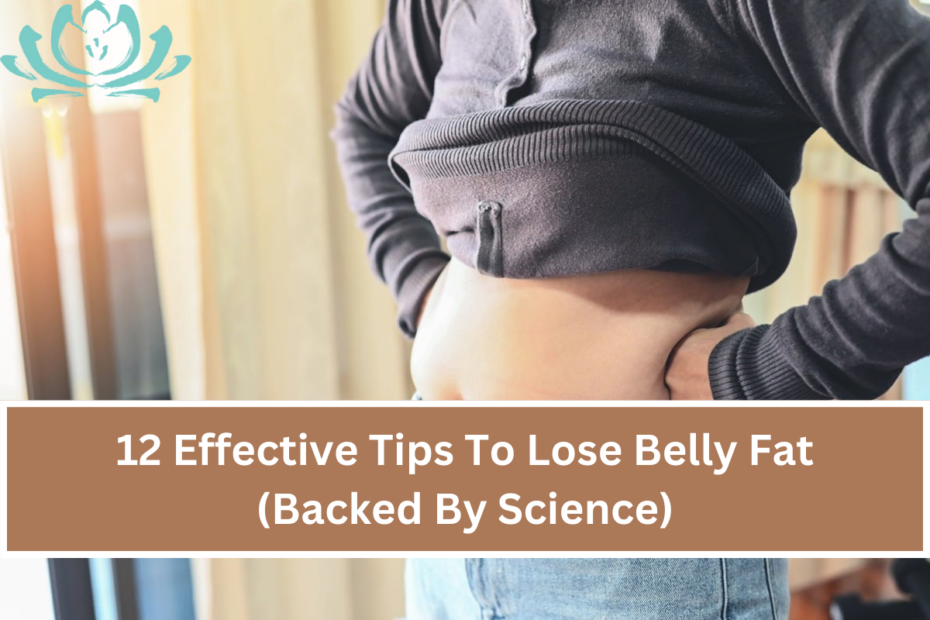12 Effective Tips To Lose Belly Fat (Backed By Science):- “Hidden” fat, also called visceral fat, wraps around the organs in the abdomen and can raise the risk of many diseases, such as Alzheimer’s, type 2 diabetes, and cancer. To lose it, you need to slowly start doing things that are better for you.
12 Effective Tips To Lose Belly Fat (Backed By Science)
1. Daily moderate aerobic exercise.
- Although nutrition is often prioritised for weight management, aerobic activity burns fat. Unlike the anaerobic system, the aerobic system uses glycogen and fat for energy.
- In a 10-month study on aerobic training alone and weight loss, participants lost 5.7% of their body weight by exercising 400 or 600 kcal/5 days a week compared to the control group doing nothing.
- The US Department of Health and Human Services recommends 150 minutes of moderate aerobic activity a week to maintain a healthy weight. Include jogging, cycling, or swimming in your weekly regimen.
2. Increase your training intensity.
- High-intensity training alternates brief intense exercise with rest. This workout boosts fat oxidation, making it more effective than ordinary training.
- In a 15-week study, young women who did high-intensity interval training three times a week lost body fat, especially visceral fat, and insulin resistance.
- Scientists created Reduced Exertion HIIT (REHIT) to maximise the benefits of high-intensity training in a shorter workout.
- CAROL Bike’s 5-minute REHIT programme focuses on working at full capacity with 2×20-second sprints, followed by recovery and cool-down periods.
- Your body goes into fight-or-flight mode and burns more fat. An 8-week study found that REHIT increased visceral fat reduction faster and more effectively than standard training.
3. Strength workout regularly.
- Aerobic and resistance training provide better belly fat loss and cortisol improvements than aerobic exercise alone, studies show.
- Strength training boosts aerobic endurance. Your resting metabolic rate improves with muscle mass, so you burn more calories for 24 hours after exercise.
- Strength training once a week in addition to other activity will assist you maintain a healthy visceral fat ratio.
4. Keep moving.
- Increasing your daily physical activity is healthy even if you already exercise enough.
- When possible, walk more, use steps instead of a lift, use a standing desk at work and park at the far end of the lot. Try little methods like this to boost your metabolism daily.
5. Cut simple carbs and sweets.
- Refined carbohydrates, sugar, and starches quickly transform into glucose, spiking energy and blood sugar.
- However, glucose depletion causes a fall of weariness and hunger, increasing food desires and calorie consumption.
- You need steady blood sugar and long-term energy from complex carbs and unsaturated fats to battle abdominal fat.
- A 2020 study found that a low-carb diet helps older people lose visceral fat. Additionally, a low-carb diet lowers insulin levels, which can inhibit fat loss.
6. Choose healthy fats.
- Instead of a low-fat diet, choose “good” fats and avoid detrimental “bad” fats.
- Unsaturated and omega-3 fats help manage weight. They deliver long-lasting energy and minimise hunger for hours. Vegetable oils, almonds, and omega-3-rich fish include healthy fats.
- In adults without cardiovascular disease, an olive oil-rich diet can help control weight, according to a 2018 study. Omega-3 supplements may considerably reduce liver and abdominal fat in adults and children with fatty liver disease.
- Consuming saturated fats from red meat and dairy in moderation can raise cholesterol and cardiovascular disease risk. Always avoid hydrogen-pumped unsaturated fats, or trans fats. One study found that trans fat diets increased monkey belly fat and insulin sensitivity.
Also Read:-15 Foods That Boost the Immune System: Citrus, Bell Peppers & More

12 Effective Tips To Lose Belly Fat (Backed By Science)
7. Eat extra protein.
- One of the best ways to lose belly fat is to eat more high-quality protein. Protein consumption reduces visceral fat, according to research.
- Protein lowers hunger, increases metabolism, keeps you full, and aids muscle repair after exercise.
- Protein-rich meals should make up 25-30% of your diet for visible improvements.
8. Eat more healthful foods.
- Fibre, probiotics, and green tea enhance digestion and reduce belly fat.
- Vegetable, fruit, and wholegrain cereal fibre absorbs water, has few calories, and travels slowly through the digestive track, keeping you full longer.
- Fibre aids digestion. A 2019 study found that fibre aids weight loss and dietary adherence.
- Probiotics help the immune system, digestion, and mental wellness.
- A study of 15 research found that probiotics reduced body fat percentage and BMI more than placebos.
- A 2022 review found that green tea lowers blood glucose and visceral fat.
- Elliptical workouts burn calories, strengthen muscles, and improve cardiovascular health.
- It works the full body by engaging lower and upper muscles.
9. Try different meal times.
- There are several meal frequency ideas. Some recommend 6 smaller meals a day, while others promote weight loss by fasting.
- To determine the optimal schedule for your body, see your doctor and try different ones.
- Some research show that frequent nourishment reduces food cravings and boosts fat oxidation for abdominal fat loss.
- No data suggests such a diet increases metabolism. Some find it more psychologically pleasant.
- For numerous reasons, alternate-day fasting trials lasting 3-12 weeks lowered body weight and fat.
- Insulin naturally falls while fasting, which aids fat reduction. Short eating windows cause you to skip at least one meal a day, reducing calories.
10. Keep calories above 1,200.
- Cutting calories too much triggers starvation mode, which decreases your metabolism to prevent excessive fat loss and starving.
- That hinders your weight loss goals. The lowest-calorie diet is 1,200 calories per day.
- Such a diet has been shown to be effective for sustainable weight loss, although calorie consumption should not be reduced.
- Calorie reduction alone won’t guarantee lasting weight control. It should be used with regular exercise and a healthy lifestyle.
11. Drink more water.
- Water boosts weight loss in many ways. It reduces hunger, improves metabolism, and makes exercise easier and more efficient, which may affect scale results.
- Water is also essential to lipolysis, the body’s fat-burning process. A 2018 study found that dehydration slows fat burning.
- For men, the U.S. National Academies of Sciences, Engineering, and Medicine recommend 3.7 litres of water and 2.7 for women.
12. Reduce alcohol.
- Alcohol use dramatically increases belly fat risk, according to studies.
- Alcohol increases hunger, increases empty calories, leads to bad food choices, and is commonly mixed with sugar in cocktails, which all contribute to weight gain.
- Drinking also overloads the liver, which won’t metabolise carbs and lipids until it uses all ethanol. Most of the food you eat while drinking becomes belly fat.
- You don’t have to give up drinking to lose tummy fat. In a month, reducing drinking frequency and intensity reduces visceral fat, according to research.
If you like this article about 12 Effective Tips To Lose Belly Fat (Backed By Science) Please share this article with your friends and family members.

